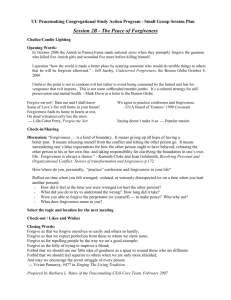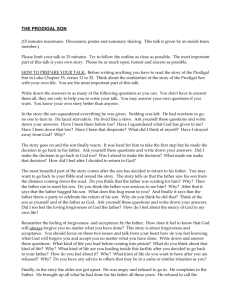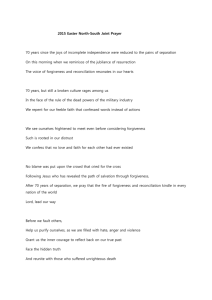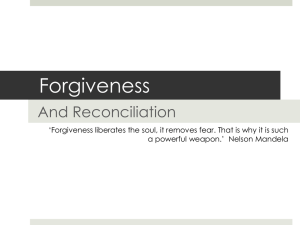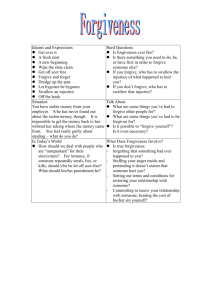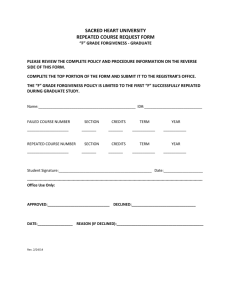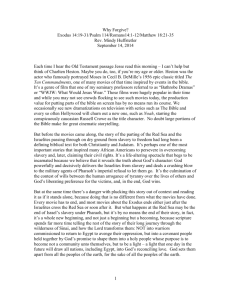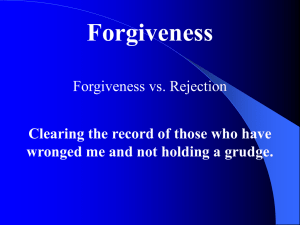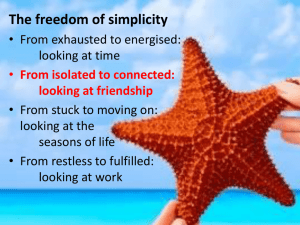The Art of Forgiveness, June 1st, Rev. Linda Simmons
advertisement
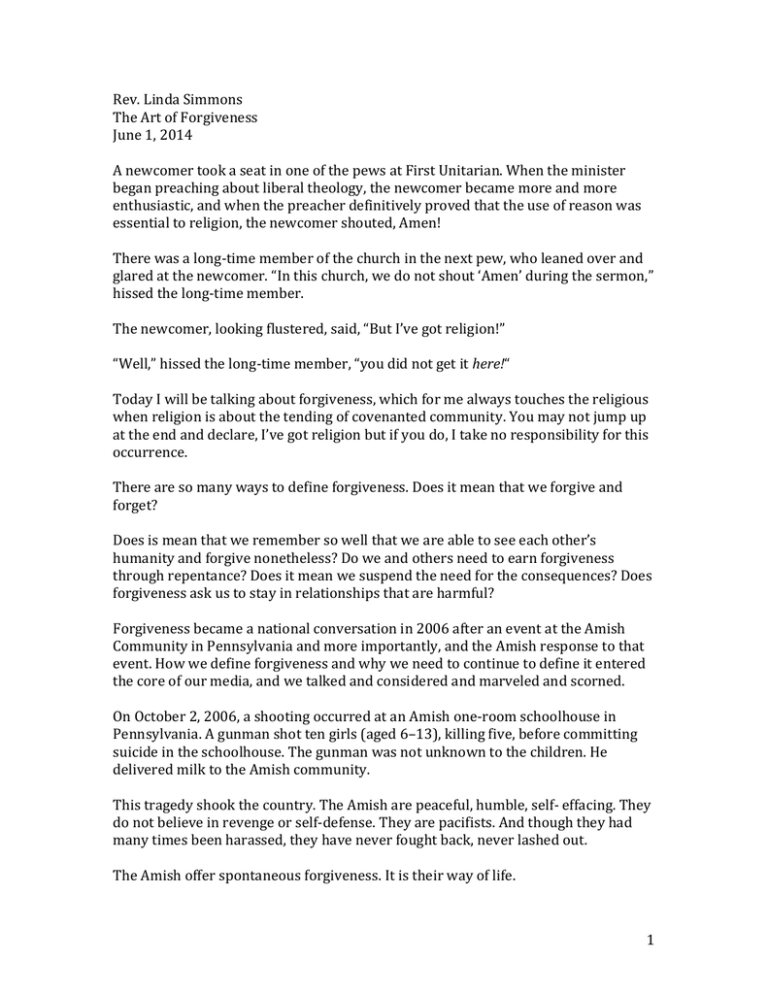
Rev. Linda Simmons The Art of Forgiveness June 1, 2014 A newcomer took a seat in one of the pews at First Unitarian. When the minister began preaching about liberal theology, the newcomer became more and more enthusiastic, and when the preacher definitively proved that the use of reason was essential to religion, the newcomer shouted, Amen! There was a long-time member of the church in the next pew, who leaned over and glared at the newcomer. “In this church, we do not shout ‘Amen’ during the sermon,” hissed the long-time member. The newcomer, looking flustered, said, “But I’ve got religion!” “Well,” hissed the long-time member, “you did not get it here!“ Today I will be talking about forgiveness, which for me always touches the religious when religion is about the tending of covenanted community. You may not jump up at the end and declare, I’ve got religion but if you do, I take no responsibility for this occurrence. There are so many ways to define forgiveness. Does it mean that we forgive and forget? Does is mean that we remember so well that we are able to see each other’s humanity and forgive nonetheless? Do we and others need to earn forgiveness through repentance? Does it mean we suspend the need for the consequences? Does forgiveness ask us to stay in relationships that are harmful? Forgiveness became a national conversation in 2006 after an event at the Amish Community in Pennsylvania and more importantly, and the Amish response to that event. How we define forgiveness and why we need to continue to define it entered the core of our media, and we talked and considered and marveled and scorned. On October 2, 2006, a shooting occurred at an Amish one-room schoolhouse in Pennsylvania. A gunman shot ten girls (aged 6–13), killing five, before committing suicide in the schoolhouse. The gunman was not unknown to the children. He delivered milk to the Amish community. This tragedy shook the country. The Amish are peaceful, humble, self- effacing. They do not believe in revenge or self-defense. They are pacifists. And though they had many times been harassed, they have never fought back, never lashed out. The Amish offer spontaneous forgiveness. It is their way of life. 1 They say that grace is a broad concept that characterizes loving and compassionate responses to others and that forgiveness is a particular form of grace. The Amish say, We believe in letting our light shine but not shining it in the eyes of other people. They reject commercial insurance and do not participate in social security. The rely on God and each other. Forgiveness was not a response that was evoked when I read the book Amish Grace and engaged in the heated discussion it evoked in a divinity school room classroom last year. We were worried as students and ministers in formation. The Amish forgave the gunman immediately and spontaneously. They told a reporter, “You mean some people actually thought we got together to plan forgiveness? We have to forgive him in order for god to forgive us. Forgiveness was a decided issue. It’s just what we do as a nonresistant people. It was spontaneous. It was automatic. It was not a new kind of thing.” Forgiveness is not a mandate from the church. Forgiveness is a way of life. Forgiveness is obedience to the interpreted word of Christ. Some of us in classroom accused others of being able to forgive everything and everyone but those who forgave spontaneously and wholeheartedly. It was a pointed observation. Others of us began to feel shame at not being able to support Amish forgiveness, worried it did not allow time to heal for the victims or to feel remorse for the perpetrators. It was not only our divinity school classroom that ended up divided about the issue of Amish forgiveness. The conversation of Amish forgiveness also divided the country. Why? Why did Amish forgiveness become a bigger and longer lasting story that the shooting of those children? Last year handguns killed 10, 728 people in our country as compared to 8-42 such deaths in Europe. Time and violence have taught us to expect shootings even as we shake and despair and mourn. But nothing in our modern world teaches us to expect forgiveness of gunmen, especially not from the parents whose children were shot down. 2 More than half of the 75 mourners at the gunman’s funeral were Amish. During this national conversation people were asking, Why is this world so hungry for forgiveness now? Why is this world so hungry for forgiveness now? Do you feel that too? Do you feel in yourself a longing to forgive and be forgiven? Do you feel it not only for yourself but our fellow Americans? From the book Amish Grace, The story of Amish forgiveness became the story- the story that trumped the narrative of senseless death- in the days that followed the shooting. Amish grace, and the way it affected the world, did not rob the tragedy of its horror, did not eradicate the grief of those it left behind. Still, it may have been an answer to Amish prayers that somehow, somewhere, some good would come of this terrible event. Several themes followed including amazement at the act of forgiveness, and a lament about mainstream American life. Amazement at the act of forgiveness. We are a country and a people that so often demand retribution. Lament about mainstream American life. We are a country weary of retribution and the cycles of violence it perpetuates. We wondered in class what would have happened after 911 if the national conversation slowly took the shape of forgiveness rather than retaliation. I know the fear this brings up. We would be taken advantage of, used, abused, further terrorized, thought of as weak. The terrorists would not then know the need to repent, that their actions were abhorrent. I have all of that in me too. And yet, I wonder. Has not all of that happened anyway, has terrorism not increased all over the world? Would it be harder to recruit young men to fight the American devil if we were known as a forgiving, measured people? If we recognized our role in events, took responsibility for our own actions in other lands? I am not suggesting that 911 was justified. Just that there are many possible responses to violence and that ours as a country, and largely as a world, is an eye of an eye, making the whole world blind. Robert McAfee Brown, professor of theology and ethics at the Pacific School of Religion writes, Supposing, just supposing, that an act of forgiveness on our part could tip the scales toward compassion rather than brutality… We argued as classmates. What does it mean to forgive the unrepentant? What does it mean to forgive so quickly? Does forgiving continue a cycle of violence or 3 interrupt it? Does forgiveness heal the wounded and allow those that do harm to heal? Tomas Borge, a Nicaraguan Sandinista fighter, captured by the contras and brutally tortured, confronted his torturer after the war ended. The court entitled him to name the punishment appropriate for this torturer. Borge responded, “My punishment is to forgive you.” In our classroom, we discussed our feelings that others must first understand and admit fault and ask for forgiveness, take responsibility, wrestle with their own souls. Spontaneous forgiveness keeps the offender and the victim from healing, some of us argued. For the Amish, it is not about the other person. It is about freeing oneself from the hatred that not forgiving breeds so that we might be open to each other, to mourning, to caring for ourselves and others. The Amish say, If we don’t forgive, we won’t be forgiven. By not forgiving, it will be more harmful to ourselves than to the one who did the harmed us. They say that forgiveness expands into an ethic of yielding to one another, renouncing self-defense and giving up the desire for justification or efforts at revenge. The Dalai Lama writes about forgiveness and the occupation of his own country, Tibet, by the Chinese. He tells the story of a Tibetan monk who served about 18 years in a Chinese prison. The Dalai Lama asked him after he escaped what the he felt was the biggest threat or danger while he was in prison. He responded that what he feared most was losing his compassion for the Chinese. Where do we begin? Where do we all begin in our own lives to forge this valley of forgiveness? I have held on for years to not forgiving my former German husband, Martin, who started using serous drugs when I was 5 months pregnant. I left him and Germany when my dear Gina was only 3 weeks old. He never sent child support, never wrote to tell me he was sorry, never expressed that he accepted responsibility or felt accountable. It felt like the only thing I could not make better for my daughter, the only pain I could not take away. I dance with forgiving him and sometimes, just as I get really close, I come back to anger because, well because, it easier in so many ways to hold onto. So much easier to get support from others. So much easier to tell a story about. Why forgive? Because as we hold onto a single story, a single truth, a single action, we are unable to know someone for all of the possibilities that they are and ultimately are also closed off from ourselves, our own contradictions, and 4 multiplicities that weave and interweave until everything is multiple, divided, containing more than one ending. To forgive, we have to move beyond the single story, which is never the only truth. We have to remember more than the pain. To forgive my former husband Martin, I have to see him in his humanity, see me in my humanity, and then I can let go, I can give thanks for what was good enough and untie myself from what broke my heart, because even my heart has more than one story to tell. Paul Ricouer, widely recognized as one of the most distinguished philosophers of the twentieth century, writes that we must forgive because it allows us to see things differently instead of finding ourselves stuck in a cycle of bitterness and hate. “It is in the accord with the logic of remembering (as mourning) that ‘forgiveness heals.’ Remembering as mourning. I love that remembering and mourning are etymologically tied. It is by mourning that we learn to rewrite our lives, to reconsider what was lost and gained, to renarrate our pasts, to reposition ourselves in our own stories with more ambiguity, nuance, shadow. Ricoeur believes that in order for us to bind ourselves to the promise of the future, we must be able to untie ourselves from the past, which he says is the act of forgiveness; to bind ourselves to the promise of the future, we must be able to untie ourselves from the past, which is the act of forgiveness. The Aramaic word for "forgive" means literally to "untie. The lines of our stories go back and back and back through our genealogies. How each of these stories is birthed in us is a complicated mystery. This does not mean that people are not accountable for their actions. It means that all actions have a story and more than one. Forgiveness gives us all the possibility of our own wholeness, our own stories written in a way that embrace promise in all its gnarled hope. Should we all forgive the way the Amish forgive? Would we be a better people? I do not know. I think the process that forgiveness entails: remembering, mourning, story telling, writing a different past and a allowing a different future are all processes of forgiveness that are valuable for those forgiving and being forgiven. Does spontaneous forgiveness truncate all of this? The Amish say they grieve like everyone else and that because they have first forgiven, there are available to be in their grief more fully. I do know that I can allow someone else’s extraordinary act of forgiveness to touch the understanding that we are all part of each other, that we are all capable of great beauty and great ugliness, that we all, given certain circumstances, physiological 5 make-ups, neighborhoods, resources or their lack- we are all capable of things that require forgiveness. To touch our humanity deeply, to touch the brokenness of story making itself, the brokenness of the humanness that we all carry, that is the work of living wholeheartedly. That is the work of that a courageous life, a life that has the capacity to name the holy, demands. And maybe in all of this we can find figure out how to forgive ourselves, the last and greatest hold out of so many of us. To forgive is to become finally, fully, human. Forgiveness that is born of the understanding that life is multi-faceted, full of many possible stories, many beginnings and ends, many contradictions and multiplicities. If we are to go on well, we need the promise of the future. Forgiveness renews that promise. May the path to forgiveness be one that calls out to you, always. Amen. 6
